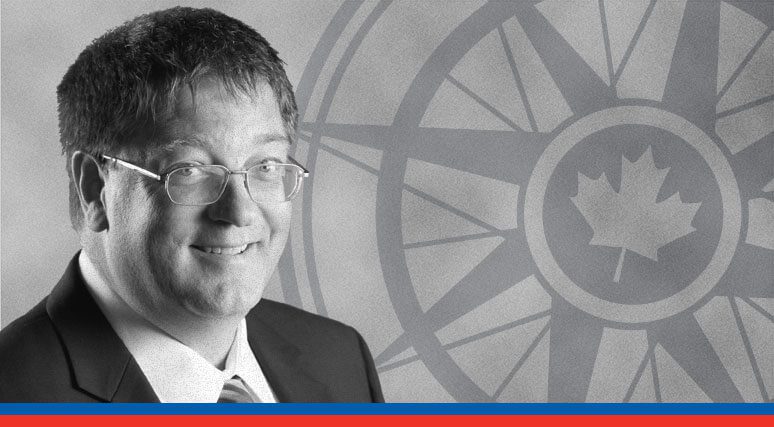- Home
- About
- Experts
- Issues
- Projects
- CNAPS (Center for North American Prosperity and Security)
- The Promised Land
- Voices that Inspire: The Macdonald-Laurier Vancouver Speaker Series
- Dragon at the door
- Canada on top of the world
- Letter to a minister
- Justice Report Card
- The Great Energy Crisis
- DisInfoWatch.org
- Managing Indigenous Prosperity
- Judicial Foundations
- Landmark Cases Council
- Defending The Marketplace of Ideas
- Reforming the University
- Past Projects
- Digital Policy & Connectivity
- Double Trouble
- Canada and the Indo-Pacific Initiative
- The Transatlantic Program
- COVID Misery Index
- Speak for Ourselves
- The Eavesdropping Dragon: Huawei
- Talkin’ in the Free World with Mariam Memarsadeghi
- An Intellectual Property Strategy for Canada
- Munk Senior Fellows
- A Mandate for Canada
- Confederation Series
- Fiscal Reform
- The Canadian Century project
- Fixing Canadian health care
- Internal trade
- From a mandate for change
- Size of government in Canada
- Straight Talk
- Labour Market Report
- Leading Economic Indicator
- Centre for Advancing Canada’s Interests Abroad
- Indigenous Prosperity at a Crossroads
- Events
- Latest News
- Libraries
- Donate
- Home
- About
- Experts
- Issues
- Projects
- CNAPS (Center for North American Prosperity and Security)
- The Promised Land
- Voices that Inspire: The Macdonald-Laurier Vancouver Speaker Series
- Dragon at the door
- Canada on top of the world
- Letter to a minister
- Justice Report Card
- The Great Energy Crisis
- DisInfoWatch.org
- Managing Indigenous Prosperity
- Judicial Foundations
- Landmark Cases Council
- Defending The Marketplace of Ideas
- Reforming the University
- Past Projects
- Digital Policy & Connectivity
- Double Trouble
- Canada and the Indo-Pacific Initiative
- The Transatlantic Program
- COVID Misery Index
- Speak for Ourselves
- The Eavesdropping Dragon: Huawei
- Talkin’ in the Free World with Mariam Memarsadeghi
- An Intellectual Property Strategy for Canada
- Munk Senior Fellows
- A Mandate for Canada
- Confederation Series
- Fiscal Reform
- The Canadian Century project
- Fixing Canadian health care
- Internal trade
- From a mandate for change
- Size of government in Canada
- Straight Talk
- Labour Market Report
- Leading Economic Indicator
- Centre for Advancing Canada’s Interests Abroad
- Indigenous Prosperity at a Crossroads
- Events
- Latest News
- Libraries
- Donate
Aboriginal Canada and the Natural Resource Economy
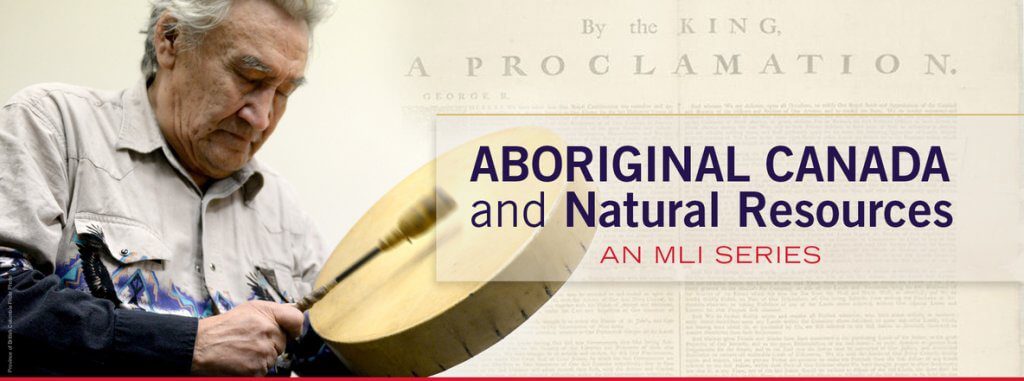
Few issues will carry as much relevance to Canadians in the coming years as the development of natural resources. But for Aboriginal Canadians, rapid resource development raises real and serious fears, based in large measure on unhappy experiences in the past. How can the two sides – First Nations and business – work together to ensure our development of natural resources is safe, stable and reliable? By drawing on a team of experienced experts in the field, including former Assembly of First Nations chief Ovide Mercredi, MLI’s wide-ranging, multi-year project Aboriginal Canada and the Natural Resource Economy project is producing solutions on difficult public policy questions.
Aboriginal Canada and the Natural Resource Economy
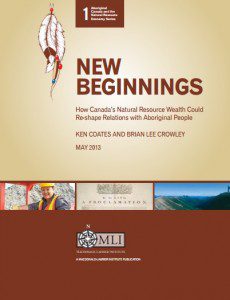 MLI Managing Director Brian Lee Crowley and Munk Senior Fellow Ken Coates made a splash with the release of two papers (here and here) that examined how the Northern Gateway pipeline and other energy projects should be a model for cooperation between First Nations and development companies. This was followed by another paper by Douglas Bland on “Canada and the First Nations: Cooperation or conflict?”
MLI Managing Director Brian Lee Crowley and Munk Senior Fellow Ken Coates made a splash with the release of two papers (here and here) that examined how the Northern Gateway pipeline and other energy projects should be a model for cooperation between First Nations and development companies. This was followed by another paper by Douglas Bland on “Canada and the First Nations: Cooperation or conflict?”
Other papers have looked at the Duty to Consult by Munk Senior Fellow Dwight Newman, the controversial Tsilhqot’in and Grassy Narrows court decisions, the possibility of revenue sharing, the future of Aboriginal legal powers, and Aboriginal skills developments.
In 2016, MLI added a new initiative exploring Aboriginal People and Environmental Stewardship, spearheaded by Bram Noble. This three-part series (here, here, and here) looked at the environmental assessment (EA) process.
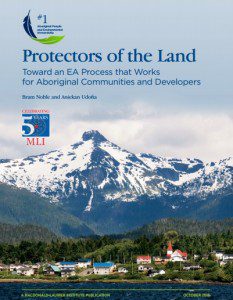 The series also looked the UN’s free, prior and informed consent (FPIC) concept and the Declaration on the Rights of Indigenous Peoples, which were were authored by Coates and Blaine Favel, Chancellor of the University of Saskatchewan and an influential Plains Cree leader. Recent papers have further explored FPIC, the Extractive Sector Transparency Measures Act, mining in Ontario’s Ring of Fire.
The series also looked the UN’s free, prior and informed consent (FPIC) concept and the Declaration on the Rights of Indigenous Peoples, which were were authored by Coates and Blaine Favel, Chancellor of the University of Saskatchewan and an influential Plains Cree leader. Recent papers have further explored FPIC, the Extractive Sector Transparency Measures Act, mining in Ontario’s Ring of Fire.
Papers for this project can be found here.
Coates released a series of videos on what’s next for pipeline development in Canada after Ottawa released in 2016 major decisions on Northern Gateway, Line 3 and Trans Mountain pipelines.
Noble was also featured in the Protectors of the Land series a videos on the EA process.
Recognition
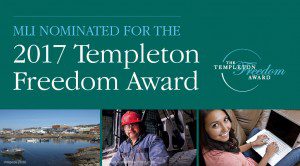 MLI’s groundbreaking work on Indigenous affairs has led to a nomination for the prestigious Templeton Freedom Award in 2017.
MLI’s groundbreaking work on Indigenous affairs has led to a nomination for the prestigious Templeton Freedom Award in 2017.
The prize, which the US-based Atlas Network awards annually, recognizes “the most exceptional and innovative contributions to the understanding of free enterprise, and the public policies that encourage prosperity, innovation, and human fulfillment via free competition.”
MLI has earned the nomination for its work on creating new opportunities for Indigenous communities, which has been recognized for fresh thinking on overcoming the challenges of state dependency and lack of opportunity.
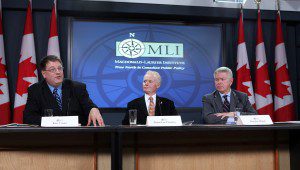 MLI’s work has received recognition from across the country. “The study by Brian Lee Crowley and Ken Coates is a ‘home run,’” said former prime minister Paul Martin. “The analysis by Douglas Bland will make many uncomfortable but it is a wake-up call that must be read.”
MLI’s work has received recognition from across the country. “The study by Brian Lee Crowley and Ken Coates is a ‘home run,’” said former prime minister Paul Martin. “The analysis by Douglas Bland will make many uncomfortable but it is a wake-up call that must be read.”
Coates, Crowley and Newman regularly comment on Aboriginal issues in newspapers, on radio stations and in television interviews. Dr. Coates has been recruited by the Government of New Brunswick as a key adviser on Aboriginal issues. Dr. Crowley’s work on the East Coast Aboriginal fishery stopped the government from eliminating a major – and highly successful – program. Coates and Crowley’s work on the Northern Gateway pipeline influenced the Eyford report prepared for the Government of Canada. And Dr. Coates was invited to speak at British Columbia Premier Christy Clark’s Natural Resource Forum in Prince George in January 2015.
Highlights
Finally, the legal struggle over Prairie resources has begun: Ken Coates in iPolitics
This article originally appeared in iPolitics. Below is an excerpt from the article, which can be read in full here. By Ken...
Hollywood should get the facts and show respect to Indigenous peoples: JP Gladu in the Toronto Star
Image courtesy of Gage Skidmore This article originally appeared in the Toronto Star. By JP Gladu, June 27, 2022 In...
Indigenous resource management guarantees cultural survival, with the benefits passed on to everyone: JP Gladu and Ken Coates in the Globe and Mail
This article originally appeared in the Globe and Mail. By JP Gladu and Ken Coates, June 13, 2022 Sometimes the...
Newsletter Signup
|
|
Thank you for Signing Up |

Macdonald-Laurier Institute
323 Chapel Street, Suite #300
Ottawa, Ontario, K1N 7Z2 Canada
613.482.8327
Support Us
Support the Macdonald-Laurier Institute to help ensure that Canada is one of the best governed countries in the world. Click below to learn more or become a sponsor.
© 2023 Macdonald-Laurier Institute. All Rights reserved.

